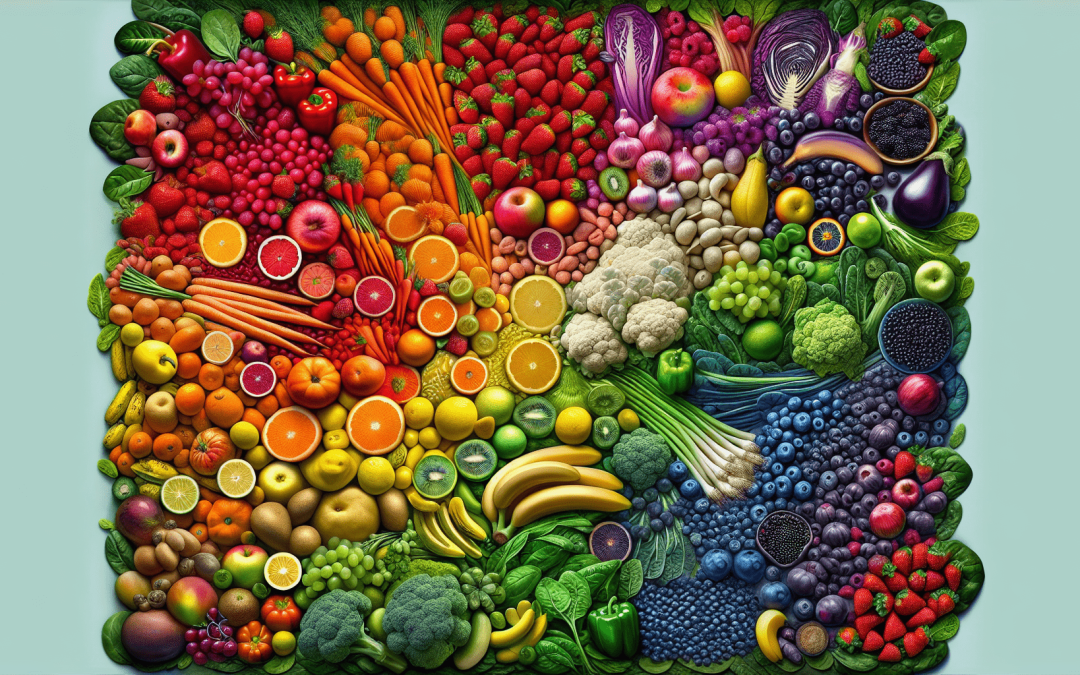Nutrition for a Healthy Life
Have you ever wondered how nutrition plays a crucial role in maintaining a healthy life? Whether you’re looking to improve your overall well-being or want to prevent chronic diseases, a balanced and nutritious diet is key to achieving optimal health.

The Basics of Nutrition
Let’s start by discussing the basics of nutrition and why it is so important for your health. Nutrition is the process of obtaining and consuming food that is necessary for growth, repair, energy, and overall well-being. It is essential for maintaining the normal functions of the body and supports your overall health.
When you consume a variety of nutrients from different foods, you provide your body with the essential components it needs to function properly. Nutrients are classified into six major categories: carbohydrates, proteins, fats, vitamins, minerals, and water. Each of these nutrients plays a specific role in maintaining your health and well-being.
Carbohydrates
Carbohydrates are the primary source of energy for your body. They are found in foods such as fruits, vegetables, whole grains, and legumes. When you consume carbohydrates, your body breaks them down into glucose, which is used as fuel for your cells. It is essential to choose complex carbohydrates over simple sugars to maintain stable energy levels throughout the day.
Proteins
Proteins are the building blocks of your body and are essential for growth and repair. They are made up of amino acids, which are necessary for the formation of tissues, muscles, and organs. Foods rich in protein include lean meats, poultry, fish, dairy products, legumes, and nuts. It is important to include a variety of protein sources in your diet to ensure you’re getting all the essential amino acids your body needs.
Fats
Fat is an essential nutrient that provides energy, supports cell growth, and helps your body absorb vitamins. There are different types of fats, including unsaturated fats (found in nuts, seeds, avocados, and olive oil) and saturated fats (found in animal products and processed foods). It is important to choose healthy fats over unhealthy fats to reduce the risk of heart disease and other chronic conditions.
Vitamins and Minerals
Vitamins and minerals are micronutrients that are essential for various functions in your body. They play a crucial role in supporting your immune system, regulating metabolism, and maintaining overall health. Foods rich in vitamins and minerals include fruits, vegetables, whole grains, and lean proteins. Consuming a variety of nutrient-dense foods will help you meet your daily requirements for essential vitamins and minerals.
Water
Water is often overlooked but is one of the most important nutrients for your body. It is essential for hydration, digestion, and overall health. Staying adequately hydrated helps your body function properly and supports your metabolism. Make sure to drink plenty of water throughout the day and limit your intake of sugary beverages to maintain optimal hydration.
Benefits of Whole Foods
When it comes to nutrition, whole foods are your best option for maintaining a healthy life. Whole foods are foods that are minimally processed and do not contain added sugars, fats, or preservatives. They are rich in essential nutrients and provide a wide range of health benefits for your body.
Nutrient Density
Whole foods are packed with essential nutrients, including vitamins, minerals, fiber, and antioxidants. They offer a higher nutrient density compared to processed foods, which are often stripped of their natural nutrients during manufacturing. By consuming whole foods, you provide your body with the necessary components it needs to function optimally.
Fiber Content
Whole foods are a great source of dietary fiber, which plays a crucial role in digestion, weight management, and overall health. Fiber helps regulate blood sugar levels, promotes satiety, and supports healthy gut bacteria. By incorporating whole grains, fruits, vegetables, and legumes into your diet, you can increase your fiber intake and improve your digestive health.
Antioxidant Properties
Whole foods are rich in antioxidants, which help protect your cells from damage caused by free radicals. Antioxidants may reduce inflammation, support immune function, and prevent chronic diseases such as heart disease, diabetes, and cancer. By consuming a variety of colorful fruits and vegetables, you can ensure you’re getting a wide range of antioxidants to support your overall health.
Improved Digestion
Whole foods are easier for your body to digest compared to processed foods, which are often laden with artificial ingredients and additives. By choosing whole grains, lean proteins, fruits, and vegetables, you can support healthy digestion and reduce the risk of digestive issues such as bloating, constipation, and indigestion. Fiber-rich foods also promote regular bowel movements and support gut health.
Building a Balanced Diet
Building a balanced diet that incorporates whole foods is essential for maintaining your health and well-being. By including a variety of nutrient-dense foods in your daily meals, you can ensure you’re getting all the essential nutrients your body needs to function optimally. Here are some tips for building a balanced diet:
Choose a Variety of Foods
Eating a variety of foods from different food groups ensures you’re getting all the essential nutrients your body needs. Aim to include fruits, vegetables, whole grains, lean proteins, and healthy fats in your meals to ensure you’re getting a wide range of vitamins, minerals, and antioxidants.
Focus on Whole Grains
Whole grains are a great source of fiber, vitamins, and minerals. They provide sustained energy, promote satiety, and support healthy digestion. Incorporate whole grains such as brown rice, quinoa, oats, and whole wheat bread into your diet to increase your fiber intake and improve your overall health.
Include Lean Proteins
Proteins are essential for growth, repair, and overall health. Choose lean proteins such as poultry, fish, tofu, beans, and legumes to reduce your intake of saturated fats and support muscle growth. Including a variety of protein sources in your diet ensures you’re getting all the essential amino acids your body needs.
Add Colorful Fruits and Vegetables
Fruits and vegetables are rich in vitamins, minerals, and antioxidants that support your overall health. Aim to include a variety of colorful fruits and vegetables in your meals to ensure you’re getting all the essential nutrients your body needs. Different colored fruits and vegetables offer different health benefits, so mix it up for optimal nutrition.
Limit Processed Foods
Processed foods are often high in additives, preservatives, and unhealthy fats. They are stripped of their natural nutrients during manufacturing and can contribute to inflammation, weight gain, and chronic diseases. Limit your intake of processed foods and focus on whole foods to support your health and well-being.
Stay Hydrated
Water is essential for hydration, digestion, and overall health. Make sure to drink plenty of water throughout the day to support your body’s functions and maintain optimal hydration. Limit your intake of sugary beverages and caffeine to ensure you’re properly hydrating your body.
Planning Your Meals
Planning your meals ahead of time can help you make healthier choices and ensure you’re getting all the essential nutrients your body needs. By preparing meals in advance and having healthy snacks readily available, you can avoid unhealthy temptations and support your overall health.
Meal Prep
Meal prepping involves preparing meals and snacks ahead of time to save you time and ensure you’re making healthy choices. When meal prepping, choose whole foods such as lean proteins, whole grains, fruits, and vegetables to support your health. Portion out your meals into containers for easy grab-and-go options throughout the week.
Healthy Snacking
Healthy snacking is an important part of maintaining your energy levels and supporting your overall health. Choose nutrient-dense snacks such as fruits, vegetables, nuts, seeds, and yogurt to curb hunger between meals. Avoid processed snacks that are high in sugar and unhealthy fats and opt for whole foods to support your well-being.
Balanced Meals
Building balanced meals that include a variety of nutrients is essential for supporting your health and well-being. Aim to include a source of lean protein, whole grains, colorful fruits and vegetables, and healthy fats in each meal to ensure you’re getting all the essential components your body needs. Balancing your meals will help you maintain stable energy levels and support your overall health.

Supplements and Nutritional Support
While whole foods should be your primary source of nutrients, there are instances where you may need additional support through supplements. Supplements can help fill in the gaps in your diet and provide you with essential nutrients that may be lacking. It is important to consult with a healthcare provider before starting any new supplements to ensure they are safe and effective for you.
Vitamin D
Vitamin D is essential for bone health, immune function, and overall well-being. It is primarily obtained through sun exposure, but many people do not get enough sunlight to meet their daily requirements. Taking a vitamin D supplement can help ensure you’re getting enough of this essential nutrient to support your health.
Omega-3 Fatty Acids
Omega-3 fatty acids are essential fats that are important for heart health, brain function, and inflammation reduction. They are found in fatty fish, flaxseeds, and walnuts, but many people do not consume enough of these foods to meet their needs. Taking an omega-3 supplement can help support your overall health and well-being.
Probiotics
Probiotics are beneficial bacteria that support gut health, digestion, and immune function. They are often found in fermented foods such as yogurt, sauerkraut, and kefir, but you may need additional support through a probiotic supplement. Probiotics can help maintain a healthy balance of gut bacteria and support your digestive health.
Multivitamins
Multivitamins are supplements that provide a combination of essential vitamins and minerals to support overall health. They can help fill in the gaps in your diet and ensure you’re getting all the necessary nutrients your body needs. When choosing a multivitamin, opt for a high-quality supplement that provides a wide range of nutrients to support your health.
Conclusion
Nutrition plays a crucial role in maintaining a healthy life and supporting your overall well-being. By choosing whole foods, planning balanced meals, and incorporating essential nutrients into your diet, you can ensure you’re getting all the components your body needs to function optimally. Remember to focus on variety, balance, and nutrient-dense foods to support your health and well-being. Make small changes to your diet over time and prioritize your health to achieve optimal results. Your body will thank you for taking care of it with nourishing whole foods that support your health and vitality.








